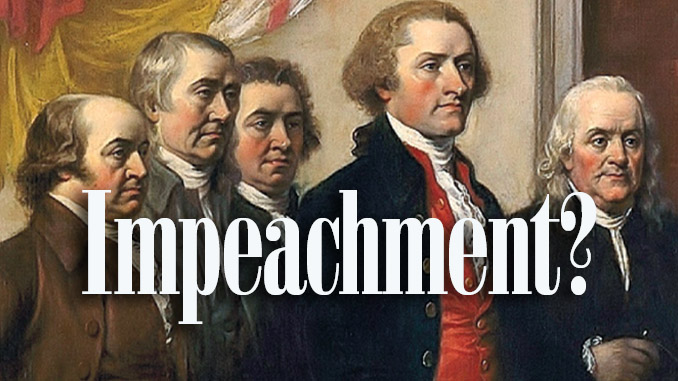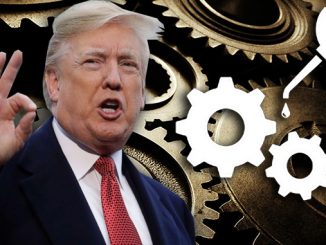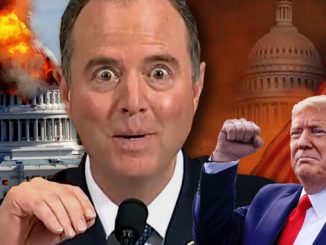
Ridding America of its Executive extends to the founding fathers.
By S.T. Patrick
It’s difficult to imagine Ben Franklin, James Madison, and Patrick Henry concerned with impeachment. The infant newspapers of the day, including the first American daily, The Pennsylvania Packet and Daily Advertiser, had only dreamed of reaching the scope and influence of a USA Today or New York Times. Yet, the founding fathers had disengaged themselves from a mother country and her king. They had dealt intimately with the follies of royal appointees throughout their lives. When in 1787 these men gathered in Philadelphia to draft a constitution for the new country, the failures of leadership were quite present in their minds.
It had been decided that an executive should be open to impeachment. Franklin was looked upon to add the exclamation point to the question of executive permanence, which he did. “What was the practice before in cases where the chief magistrate rendered himself obnoxious?” Franklin asked rhetorically. “Why, recourse was had to assassination in which he was not only deprived of his life but of the opportunity of vindicating his character. It would be the best way therefore to provide in the Constitution for the regular punishment of the executive where his misconduct should deserve it, and for his honorable acquittal when he should be unjustly accused.”
Elbridge Gerry of Massachusetts rose amidst the intense humidity of Constitution Hall, closed off from the public at the height of summer to protect the secrecy of the proceedings, to suggest that the new nation’s chief executive “be removable on impeachment and conviction for malpractice or neglect of duty.” Gerry was not alone in thinking an executive (a president) should be open to impeachment for what would amount to political malpractice. Virginia’s George Mason agreed with Gerry; South Carolina’s Charles Cotesworth Pinckney did not.
Madison of the powerful Virginia delegation further specified why impeachment was an important check on a sitting president. “It is indispensable that some provision be made for defending the community against incapacity, negligence, or perfidy of the chief magistrate,” Madison said. “The limitation of the period of his service is not a sufficient security. He might lose his capacity after his appointment. He might pervert his administration into a scheme of peculation [embezzlement] or oppression. He might betray his trust to foreign powers.” Madison clearly believed the president could get lost in the position, misuse the power of the post, or simply behave badly. Should the term limit of four years be the only defense a nation has for ineptitude within the highest office?
Pinckney feared a legislature that would hold the threat of impeachment as a perpetual sword of Damocles over the head of a frightened executive, thus limiting “his independence” and his ability to act boldly.
 Gerry excitedly rose to correct Pinckney. “A good magistrate will not fear them,” he instructed Pinckney. “A bad one ought to be kept in fear of them.” Gerry urged his colleagues to remember that a president should not fall under “the maxim that the chief magistrate could do no wrong.”
Gerry excitedly rose to correct Pinckney. “A good magistrate will not fear them,” he instructed Pinckney. “A bad one ought to be kept in fear of them.” Gerry urged his colleagues to remember that a president should not fall under “the maxim that the chief magistrate could do no wrong.”
Virginian Edmund Randolph chimed in to clarify one of the most prescient points of the debate. Randolph knew then what we know now. The most likely misuse of presidential power will stem from the ability to engage in expensive conflict.
“Guilt, whenever found, ought to be punished,” Randolph said. “The executive will have great opportunities of abusing his power, particularly in time of war, when military force and in some respect the public money will be in his hands.”
Little did Randolph know that America’s executive and legislative leaders would later embroil the country in a permanent war state with escalating costs. Little did Randolph know that it would be in these times, and because of these times, that the leaders would so divest the American people of their constitutional liberties.
Impeachment was included in Section 4, Article II of the Constitution. After even more debate, the grounds were also specified: “The president, vice president, and all civil officers of the United States, shall be removed from office on impeachment for, and conviction of, treason, bribery, or other high crimes and misdemeanors.”
Some anti-federalists, such as Patrick Henry, Virginia’s first governor, opposed the Constitution at first, believing the document still lacked the power to prevent or overthrow a tyrant and protect the rights of the populace. The newly united states, however, found it agreeable and it became the supreme law of the land.
The following 13 presidents have had resolutions introduced to begin impeachment proceedings: John Tyler, James Buchanan, Andrew Johnson, U.S. Grant, Herbert Hoover, Harry Truman, Richard Nixon, Ronald Reagan, George H.W. Bush, Bill Clinton, George W. Bush, Barack Obama, and Donald Trump. Most efforts died in committee.
S.T. Patrick holds degrees in both journalism and social studies education. He spent 10 years as an educator and now hosts the “Midnight Writer News Show.” His email is [email protected]. He is also an occasional contributor to TBR history magazine and the current managing editor of Deep Truth Journal (DTJ), a new conspiracy-focused publication available from the AFP Online Store.





